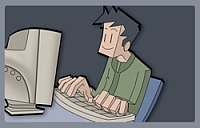While we still do not know the details of the OLPC4Libya implementation plan, what might be the impact of 1.2 million Internet-enabled 2B1 laptops on Libyan society?
First, how open will Negroponte's computers be? Will the 1.2 million students really have unfettered satellite Internet access? Or at least greater access to the Internet using the 2B1 Children's Machine than the current 205,000 Internet users in Libya? If the Libyan government was more welcoming to digital divide expert Andy Carvin, we might have a baseline to assess the OLPC impact:
I'm still bummed that the Libyan govt wouldn't give me a visa to visit the country following my visit to Tunisia for the WSIS summit last November.No matter its current Internet restrictions, what might the impact of even marginally more open information access have on the traditional Libyan culture? Or any hereto unconnected society?I was really eager to get a baseline sense of ICT literacy and the relative openness (or lack thereof) of local Internet access. Looks like I'll have to keep it on my to-do list for some other occasion.
American society is still debating the merits of the Information Age, while deep in its leading curve. Imagine the impact of the Internet on a society that adheres to a system of knowledge transfer from elder to younger, or anchors rules with historical text. Shouldn't there be a cultural adaptation guide delivered with each 2B1 Children's Machine?
Or as the MediaSnackers Can vs Should post asks in questioning the OLPC program:My hesitancy comes from a simple understanding that these little laptops will be internet enabled, therefore offering a window to a world which at best will be confusing, at worst, scary and negative to those who haven't been socialised with technology and media - where is the (digital/media) literacy programme to assist with this issue? Surely it should be offered with the hardware (like some social-software programme)?That is a good question: should there be a cultural integration process as part of the implementation plan? One that ensures community leaders, not just the children, accept the 2B1 laptops and enables a developing nation to take the big 'evolutionary-tech leap' into the Information Age.




I'm personally all for a 'Protected Internet'.
The culture shock of inflicting the Internet on a protected society is something Government leaders need to be careful of.
The Libyan Government would do well to set up their own 'Intranet' so information is controlled. Children using the Internet in free countrys are subjected to terrifying amounts of pornography and abuse and should be able to access information in a positive and informative way, much as a library and books would be accessed.
I hope Libya joins the 'First World'.
Unfettered internet access? And also mesh networking to connect to a server, and each laptop includes a microphone and speakers.
Can you say VOIP? I knew you could.
And wouldn't the student child's parents and various other people want to make use of that? And access the internet for all sorts of other things?
Predictions:
1) the child is not going to get to use the computer because of everyone else will be hogging it.
2) the little laptops will have a revolutionary impact on the village.
Or maybe not. Boing Boing reports that Iran has already locked down ISP's to less than 128K, effectively reducing Internet (and VoIP) functionality.
http://www.boingboing.net/2006/10/17/iran_limits_adsl_ban.html
Don't you think Libya would do the same?
Most of the countries that OLPC is aimed at are not remotely as politically oppressive and restrictive of internet access as is Iran.